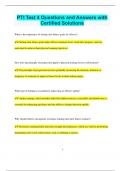PTI Test 4 Questions and Answers with
Certified Solutions
What is the importance of setting clear fitness goals for officers?
✔✔ Setting clear fitness goals helps officers maintain focus, track their progress, and stay
motivated to achieve their physical training objectives.
How does the principle of progression apply to physical training for law enforcement?
✔✔ The principle of progression involves gradually increasing the intensity, duration, or
frequency of workouts to improve fitness levels without risking injury.
What type of training is essential for improving an officer's agility?
✔✔ Agility training, which includes drills like ladder exercises, cone drills, and shuttle runs, is
essential for enhancing quickness and the ability to change direction rapidly.
Why should officers incorporate resistance training into their fitness routines?
✔✔ Resistance training builds muscular strength and endurance, which are vital for performing
demanding tasks in law enforcement, such as subduing a suspect.
1
,What are the benefits of interval training for officers?
✔✔ Interval training enhances cardiovascular fitness and stamina by alternating periods of high-
intensity exercise with periods of rest or lower intensity.
How does mental conditioning complement physical training for law enforcement officers?
✔✔ Mental conditioning helps officers develop focus, resilience, and stress management skills,
which are crucial for performing under pressure in the field.
What is the role of nutrition in an officer’s overall fitness program?
✔✔ Nutrition provides the necessary fuel and nutrients to support physical training, recovery,
and overall health, impacting performance and well-being.
How can officers assess their physical fitness levels?
✔✔ Officers can assess their fitness levels through physical tests that measure strength,
endurance, flexibility, and body composition.
Why is recovery an important aspect of a physical training program?
✔✔ Recovery allows the body to heal, rebuild muscle tissue, and prevent injuries, ensuring that
officers can train consistently and effectively.
2
,What types of exercises are beneficial for improving core stability?
✔✔ Exercises like planks, bridges, and rotational movements are beneficial for improving core
stability, which supports overall physical performance.
How does teamwork contribute to effective physical training in law enforcement?
✔✔ Teamwork fosters camaraderie, increases motivation, and creates a supportive environment
that encourages officers to push each other toward their fitness goals.
What strategies can officers use to maintain a balanced training program?
✔✔ Officers should incorporate a mix of cardiovascular, strength, flexibility, and agility training
to maintain a well-rounded fitness program.
What are the signs of overtraining that officers should be aware of?
✔✔ Signs of overtraining include persistent fatigue, decreased performance, increased
irritability, and a higher risk of injuries, indicating the need for recovery.
Why is it important for officers to stay updated on fitness trends and research?
3
, ✔✔ Staying updated on fitness trends and research helps officers incorporate effective training
methods, enhancing their overall physical performance and health.
How can officers use technology to enhance their training?
✔✔ Officers can use fitness apps and wearable devices to track their workouts, monitor progress,
and set reminders for training sessions.
What is the significance of cardiovascular fitness for law enforcement officers?
✔✔ Cardiovascular fitness is crucial for endurance during long shifts, foot pursuits, and
emergency response situations, impacting an officer's effectiveness in the field.
How can proper warm-up routines prevent injuries during training?
✔✔ Proper warm-up routines increase blood flow to muscles, improve flexibility, and prepare
the body for more intense physical activity, reducing the risk of injury.
What are the psychological benefits of regular physical training for officers?
✔✔ Regular physical training can reduce stress, improve mood, boost confidence, and enhance
overall mental well-being for officers facing the demands of their job.
4




